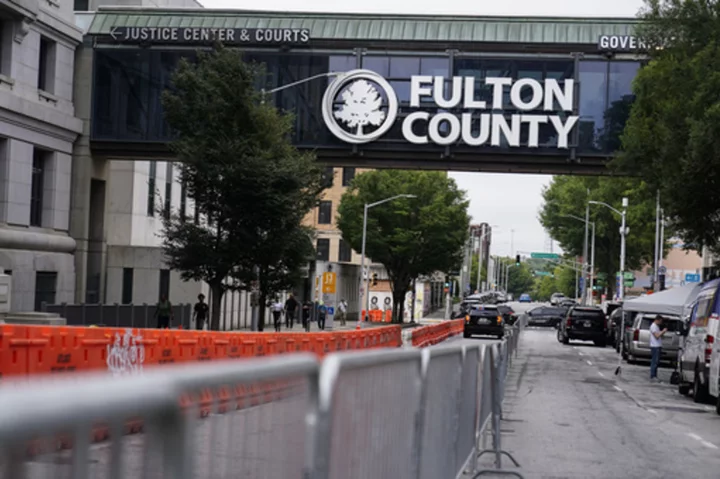
Atlanta begins to brace for the potential of a new Trump indictment as soon as next week
Donald Trump and officials in Atlanta are bracing for a new indictment that could come as soon as next week in a Georgia prosecutor’s investigation into the Republican ex-president’s efforts to overturn his 2020 election loss in the state
1970-01-01 08:00

Diehard Trump supporter Kari Lake eyes Arizona Senate bid after failed campaign for governor
Failed Republican gubernatorial candidate and election denier Kari Lake is reportedly considering jumping into Arizona’s Senate race, Axios reported. The former news anchor and darling of the MAGA Republican right rose to prominence thanks to her promoting lies about the 2020 presidential election and calling for the decertification of election results. Last year she lost to Democratic Governor Katie Hobbs but has refused to concede and has taken her complaints to courts, which have summarily rejected her attempts to overturn the election. In May, Maricopa Superior Court Judge Peter A Thompson said Ms Lake failed to prove that Maricopa, where Phoenix is located, did not verify signatures on mail-in ballots. Since then, she’s become a fixture in right-wing media and at conservative gatherings such as the Conservative Political Action Conference, where she gave the Reagan Dinner speech. Earlier this week, she campaigned for Bernie Moreno, who is running for Ohio’s Senate seat, and praised fellow MAGA Republican Sen JD Vance, who won his race. “I'm really, really excited about [Mr Vance], I'm super excited that Bernie Moreno's going to be in the Senate. And if they're in the Senate, I just might have to join them,” she said. Former president Donald Trump’s campaign praised Ms Lake and the idea of her running for Arizona’s Senate seat. “When President Trump gets back in the White House he's going to need fighters like Kari Lake in Washington, DC to help enact his Agenda 47,” senior Trump adviser Caroline Wren told Axios. Arizona’s incumbent Sen Kyrsten Sinema has not indicated whether she will seek another term in the Senate. In 2018, she became the first Democrat to win a Senate race in Arizona in 30 years. But Ms Sinema left the Democratic Party to become an independent in December. Rep Ruben Gallego (D-AZ) announced he would run for Arizona’s Senate seat as a Democrat and outraised Ms Sinema in the last fundraising quarter. But despite her consistent opposition to many parts of his agenda, Ms Sinema joined President Joe Biden when he designated the greater Grand Canyon as a national monument on Tuesday. But a poll from Noble Predictive Insights showed that Ms Sinema would trail both Mr Gallego and Ms Lake in a hypothetical three-way matchup. Read More Biden to announce historic Grand Canyon monument designation during Arizona visit Senator who once worked at a Planned Parenthood warns that Republicans are planning a national abortion ban Sinema cites bill targeting leaders of failed banks after criticism of her Wall Street ties Trump ‘fake elector’ memo details 2020 election plan as Christie reacts to new insult Ron DeSantis removes Florida’s only Black woman state prosecutor from office Senator Dianne Feinstein briefly hospitalised after fall
1970-01-01 08:00

Florida's DeSantis replaces elected Democratic prosecutor
Florida Governor Ron DeSantis on Wednesday suspended a county prosecutor after accusing her of being soft on crime,
1970-01-01 08:00
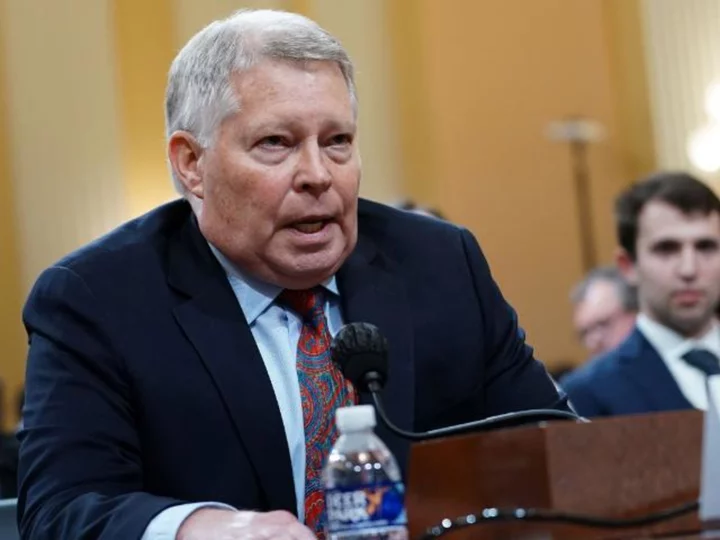
Ex-federal judge and prominent conservative: 'There is no Republican Party'
J. Michael Luttig, a conservative retired federal judge and key adviser to former Vice President Mike Pence, declared on Wednesday that "there is no Republican Party" and said former President Donald Trump is even more dangerous than he was in the aftermath of the 2020 election.
1970-01-01 08:00
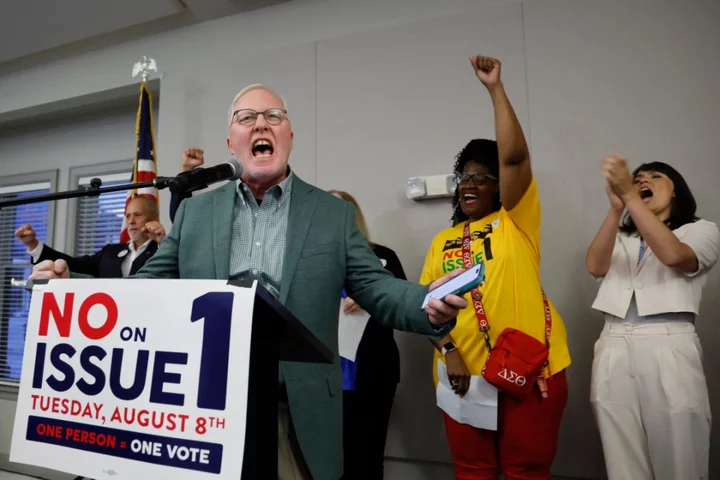
Ohio vote shows enduring power of abortion rights at ballot box, giving Democrats a path in 2024
Abortion wasn't technically on the ballot in Ohio's special election. But the overwhelming defeat of a measure that would have made it tougher to enshrine abortion rights in the state constitution this fall was the latest indicator that the issue remains a powerful force at the ballot box. The election saw heavy turnout for what's typically a sleepy summer election date and sets up another battle in November, when Ohio will be the only state this year to have reproductive rights on the ballot. It also gives hope to Democrats and other abortion rights supporters who say the matter could sway voters their way again in 2024. That's when it could affect races for president, Congress and statewide offices, and when places such as the battleground of Arizona may put abortion questions on their ballots as well. Democrats described the victory in Ohio, a one-time battleground state that has shifted markedly to the right, as a “major warning sign” for the GOP. “Republicans’ deeply unpopular war on women’s rights will cost them district after district, and we will remind voters of their toxic anti-abortion agenda every day until November,” said Aidan Johnson, a spokesperson for the Democratic Congressional Campaign Committee. The measure voters rejected Tuesday, known as Issue 1, would have required ballot questions to pass with 60% of the vote rather than a simple majority. Interest was unusually high, with millions spent on each side and voters casting more than double the number of early in-person and mail ballots ahead of the final day of voting as in a typical primary election. Early turnout was especially heavy in the Democratic-leaning counties surrounding Cleveland, Columbus and Cincinnati. Opposition to the measure, which became a kind of proxy for the November abortion vote, extended even into traditionally Republican areas. In early returns, support for the measure fell far short of Donald Trump’s performance during the 2020 election in nearly every county. The November ballot question will ask voters whether individuals should have the right to make their own reproductive health care decisions, including contraception, abortion, fertility treatment and miscarriage care. Ohio's GOP-led state government in 2019 approved a ban on abortion after cardiac activity is detected — around six weeks, before many women know they are pregnant — but the ban was not enforced because of the U.S. Supreme Court ruling in Roe v. Wade, which granted a federal right to the procedure. When a new conservative majority on the high court last year overturned the nearly 50-year-old ruling, sending authority over the procedure back to the states, Ohio's ban briefly went into effect. But a state court put the ban on hold again while a challenge alleging it violates the state constitution plays out. During the time the ban was in place, an Indiana doctor came forward to say she had performed an abortion on a 10-year-old rape victim from Ohio who could not legally have the procedure in her home state. The account became a national flashpoint in the debate over abortion rights and underscored the stakes in Ohio. Ohio is one of about half of U.S. states where citizens may bypass the Legislature and put ballot questions directly to voters, making it an option that supporters of reproductive rights have increasingly turned to since Roe v. Wade fell. After abortion rights supporters said they hoped to ask voters in November to enshrine the right in the state constitution, Ohio Republicans put Issue 1 on Tuesday’s ballot. In addition to raising the threshold to pass a measure, it would have required signatures to be collected in all 88 counties, rather than 44. The 60% threshold was no accident, abortion rights supporters say, and was aimed directly at defeating the Ohio abortion measure. Since Roe v. Wade was overturned, six states have had elections regarding reproductive rights. In every election — including in conservative states like Kansas — voters have supported abortion rights. In Kansas, 59% voted to preserve abortion rights protections, while in Michigan 57% favored an amendment that put protections in the state constitution. Last year, 59% of Ohio voters said abortion should generally be legal, according to AP VoteCast, a broad survey of the electorate. Last month, a poll by the Associated Press-NORC Center for Public Affairs Research found the majority of U.S. adults want abortion to be legal at least through the initial stages of pregnancy. The poll found that opinions on abortion remain complex, with most people believing abortion should be allowed in some circumstances and not in others. Opponents of the Ohio abortion question ran ads that suggested the measure could strip parents of their ability to make decisions about their child’s health care or to even be notified about it. Amy Natoce, spokesperson for the anti-abortion campaign Protect Women Ohio, called the ballot measure a “dangerous anti-parent amendment.” Several legal experts have said there is no language in the amendment supporting the ads’ claims. Peter Range, CEO of Ohio Right to Life, said he has been traveling across Ohio talking to people and “I’ve never seen the grassroots from the pro-life side more fired up to go and defend and protect the pre-born.” While the November question pertains strictly to Ohio, access to abortion there is pivotal to access across the Midwest, said Alison Dreith, director of strategic partnership for the abortion fund Midwest Access Coalition. Nine Midwestern states — Indiana, Iowa, Kansas, Ohio, Nebraska, Missouri, North Dakota, South Dakota and Wisconsin — are considered restrictive, very restrictive or most restrictive of abortion rights by the Guttmacher Institute, a research and policy organization that supports legal access to abortion. “Ohio in particular has always been a destination state for the states around it,” Dreith said. “If we don’t protect abortion access in Ohio, the options just continue to shrink for people seeking care in the Midwest.” Sri Thakkilapati, the executive director of the Cleveland-based nonprofit abortion clinic Preterm, said the effect of the Ohio vote will reverberate throughout the country. “When we restrict access in one state, other states have to take up that patient load,” she said. “That leads to longer wait times, more travel, higher costs for patients." Thakkilapati called the energy around abortion rights in last year's midterms “exciting.” But she said the media attention died down, and people quickly forgot “how tenuous abortion access is right now.” The special election and ballot measure in Ohio are “a reminder of what’s at stake," Thakkilapati said. “Other states are watching how this plays out in Ohio, and it may give anti-abortion groups in other states another strategy to threaten abortion rights elsewhere,” she said. “And for the majority who do want abortion access in their states but are seeing it threatened, the results in November could give them hope that the democratic process may give them relief.” Kimberly Inez McGuire, the executive director of Unite for Reproductive and Gender Equity, which focuses on young people of color under age 30, says the results of elections involving reproductive rights show that support doesn't come just from Democrats or in cities and states considered liberal bastions. “There was this idea that we couldn’t win on abortion in red states and that idea has really been smashed,” McGuire said. So, too, she said, is the “mythology” that people in the South and Midwest won't support abortion rights. “I think 2024 is going to be huge,” she said. “And I think in many ways, Ohio is a proving ground, an early fight in the lead up to 2024.” Dreith said that since abortion hasn't been on a major ballot since last year, the Ohio vote this fall is “a good reminder” for the rest of the country. “Abortion is always on the ballot — if not literally but figuratively through the politicians we elect to serve us,” she said. "It’s also a reminder that this issue isn’t going away.” Read More Ukraine war’s heaviest fight rages in east - follow live Charity boss speaks out over ‘traumatic’ encounter with royal aide Why Ohio's Issue 1 proposal failed, and how the AP called the race Ohio voters reject GOP plan to thwart upcoming abortion rights proposal Abortion rights advocates push for 2024 ballot initiative in Arizona
1970-01-01 08:00
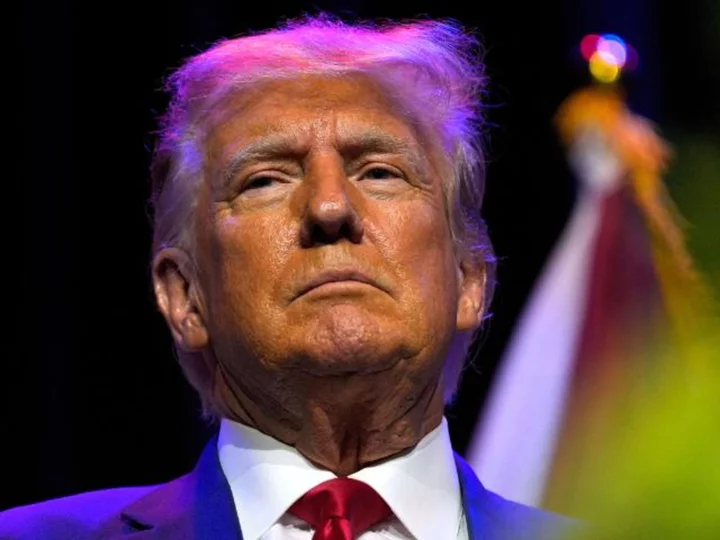
NYT: Architect of Trump fake electors plot thought SCOTUS would 'likely' reject plan, but pushed ahead anyway
An internal Trump campaign memo from December 2020, made public Tuesday by The New York Times, reveals new details about how the campaign initiated its plan to subvert the Electoral College process and install fake GOP electors in multiple states after losing the 2020 presidential election.
1970-01-01 08:00
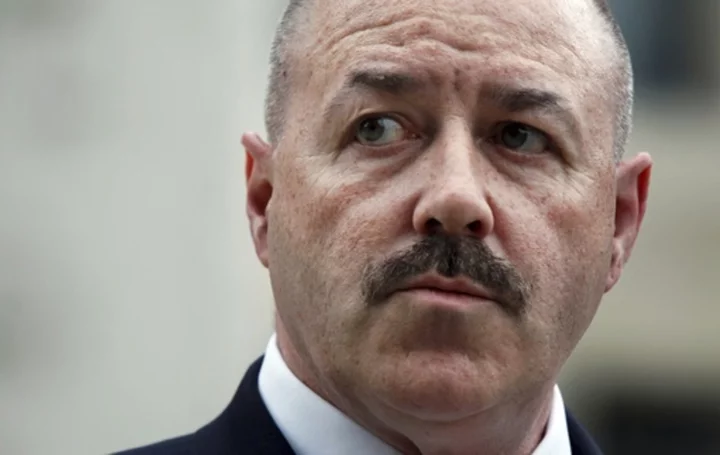
Bernie Kerik, who advised Giuliani after Trump's 2020 election loss, meets with Jack Smith's team
Former New York Police Commissioner Bernie Kerik has met with investigators from special counsel Jack Smith’s team
1970-01-01 08:00
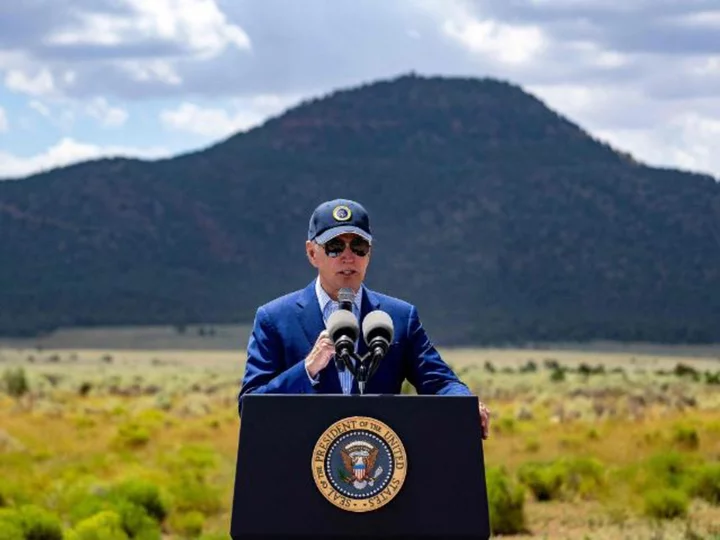
Biden tries to bolster his climate credentials as activists push for more urgency
President Joe Biden is traveling west this week on a mission to ramp up excitement for an agenda that -- so far -- is yielding little political upside.
1970-01-01 08:00
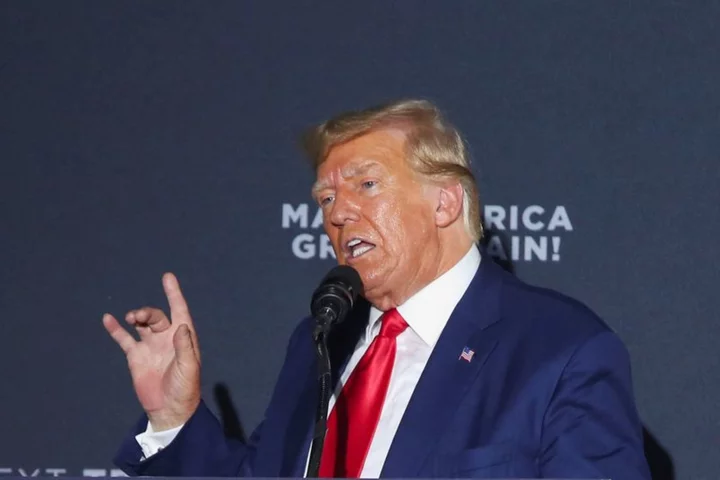
Fox Business to host second Republican debate -Politico
WASHINGTON Fox Business will hold the second debate of the 2024 Republican presidential contest, Politico news outlet reported
1970-01-01 08:00
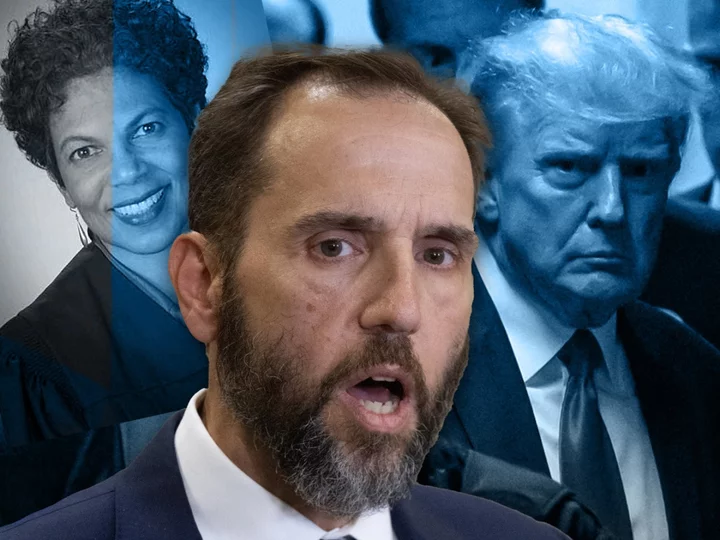
Jack Smith may force Trump to pay back millions in donations, ex-FBI official says
Donald Trump may be eventually forced to return millions of dollars of campaign funds he raised after the 2020 elections on fraudulent claims, a retired FBI official said on Tuesday. Frank Figliuzzi, a former FBI assistant director, said it “isn’t over” for Mr Trump after he was indicted over alleged efforts to overturn 2020 election results in charges led by special counsel Jack Smith in federal district court in Washington DC. “When you raise millions based on a fraudulent claim, you’ve committed a crime. And, you just might have to give those millions back... Special counsel still scrutinizing finances of Trump’s PAC,” Mr Figliuzzi said in a post on X, formerly Twitter. His comments came on the heels of a Politico report which said investigators held a closed-door interview on Monday with Bernard Kerik, the disgraced ex-NYPD Commissioner who was pardoned by Donald Trump in 2020. His lawyer Tim Parlatore told the outlet that Mr Kerik was quizzed with multiple questions on the enormous fundraising haul by Save America’s PAC in the weeks between Election Day and Jan 6 riots at the Capitol. The special counsel has been long thought to have been focusing the investigation on whether Mr Trump or his PAC broke federal laws by soliciting funds based on false voter fraud allegations. However, the recent indictment of Mr Trump does not contain any accusations of financial wrongdoing. The report said the interview was the clearest indication yet of Mr Smith’s focus on fundraising and spending by Mr Trump’s political action committee. “It’s a laser focus from Election Day to Jan. 6,” Mr Parlatore reportedly said. Kerik, a longtime ally of former Trump lawyer Rudy Giuliani, was pardoned by the ex-president in 2020. He pleaded guilty in 2009 to eight felony charges involving tax fraud and making false statements to the federal government. Read More Trump makes shocking claims about DA’s sex life days before she’s due to indict him – latest Trump vows to keep campaigning on his criminal cases despite prosecutors seeking order to stop Who are the 2024 presidential election candidates? Meet the Republicans and Democrats campaigning
1970-01-01 08:00
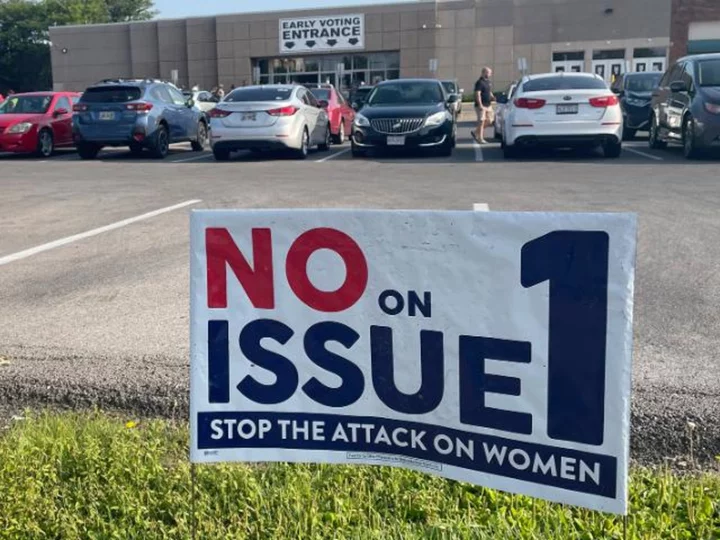
4 takeaways from abortion rights advocates' Ohio win
Abortion rights advocates on Tuesday won a critical victory in Ohio, beating back a measure that would have made their push to enshrine abortion rights in the state's constitution more difficult.
1970-01-01 08:00
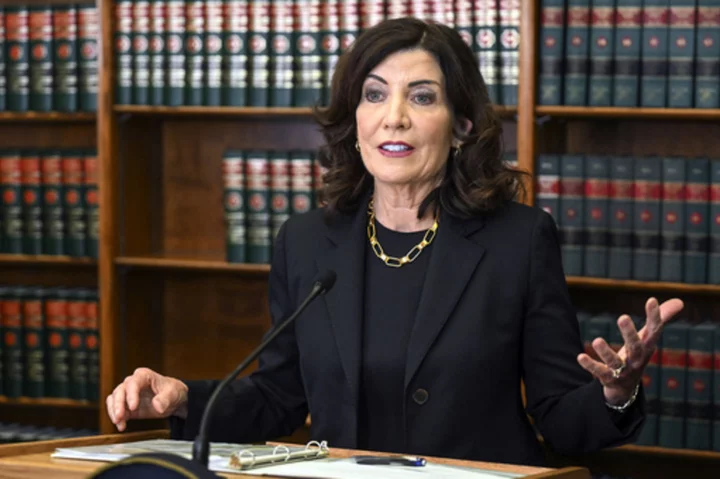
New York governor recalibrates on crime, with control of the House at stake
New York Gov. Kathy Hochul is highlighting her public safety platform in a bid to help Democrats retake control of the House
1970-01-01 08:00
